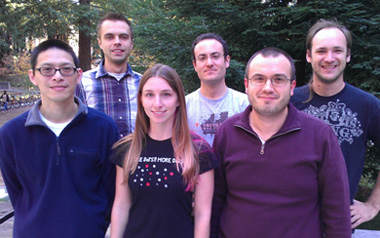Campus News
UCSC team wins cancer genomics competition
A team of bioinformatics experts made the most accurate predictions in a challenge to identify signaling networks in breast cancer cells.

A team of bioinformatics experts at UC Santa Cruz made the most accurate predictions in a competitive challenge to identify signaling networks in breast cancer cells. The results of the HPN-DREAM breast cancer network inference challenge were announced November 8 at a conference in Toronto.
“Our goal is to understand the underlying biology of cancer cells and, specifically, how genes interact with each other. The DREAM Challenge was an opportunity to test our expertise in a competitive environment,” said Artem Sokolov, a postdoctoral scholar who works with Josh Stuart, the Jack Baskin Professor of Biomolecular Engineering in UCSC’s Baskin School of Engineering. Sokolov led the team of researchers in Stuart’s lab who worked on the challenge.
Such competitions have long been used in the field of bioinformatics to identify the best computational methods for solving complex problems in biology. The specific challenge tackled by the UCSC team involved identifying cellular signaling pathways in cancer cells. Pathway analysis has been a major focus of research in Stuart’s lab, which is involved in several large cancer genomics research projects. Cancer is a disease of the genome, caused by genetic changes that lead to uncontrolled cell growth and proliferation. These genetic changes often disrupt signaling pathways that involve interactions between cellular proteins.
“Protein-protein interactions are at the heart of many biological processes in a cell,” Sokolov explained. Cell proteins form signaling networks, better known as pathways, that can pass messages from chemical receptors on the cell surface to other parts of the cell. Many cancer therapies attempt to identify overactive pathways and shut them down using inhibitors. “Unfortunately, our understanding of the underlying signaling circuitry is still limited, making the task difficult,” Sokolov said.
The goal of the breast cancer challenge was to uncover some of the important protein signaling networks in breast cancer cells. The organizers, in collaboration several cancer research labs, carried out a series of experiments on breast cancer cells grown in the laboratory, subjecting them to various stimuli and inhibitors and measuring the activity of about 45 proteins of interest over a period of four hours. Participants were given data from these experiments and challenged to predict causal links between proteins, such as “activity of protein A promotes (or inhibits) activity of protein B.”
The UCSC team combined two approaches, borrowing algorithms from unrelated fields. The “biological prior” component used heat-diffusion equations from physics to analyze information already available in a database of protein interactions. Another component of their method, developed by graduate student Dan Carlin, used an idea from economics called “Granger Causality” to find correlations. In addition to Sokolov and Carlin, the team includes graduate students Evan Paull, Kiley Graim, and Adrian Bivol, undergraduate Alden Deran, and staff researcher Chris Wong. They have been invited to submit a paper describing their methods for publication in Nature Methods.
In addition to advancing the basic understanding of the biology of cancer cells, this research could have practical applications, Sokolov said. Drug companies, for example, might use a computational analysis of signaling networks to predict how a potential drug compound would affect cancer cells, helping them select the most promising leads for further investigation.
The breast cancer network inference challenge was organized by the DREAM project (Dialogue on Reverse Engineering Assessment and Methods), which has coordinated 27 DREAM challenges over the past seven years.
Stuart is helping to organize a new DREAM project challenge to develop robust methods for predicting cancer mutations. Announced on November 8 at the Sixth Annual RECOMB/ISCB conference, the Somatic Mutation Calling DREAM Challenge will merge the efforts of the world’s largest cancer genome sequencing consortia–the International Cancer Genome Consortium (ICGC) and The Cancer Genome Atlas (TCGA)–with those of Sage Bionetworks and the DREAM project.
Like previous DREAM challenges in the series, this new challenge will engage a diverse community of scientists to solve a specific problem in a given time period by placing scientific data, tools, scoreboards and the resulting predictive models into an open commons. Data will be hosted on a petabyte-capacity data storage system provided to UCSC by Hitachi (see earlier announcement). Stuart’s work on the project is also supported by a gift from Oracle.
The specific problem the somatic mutation calling challenge will address is the need for accurate methods to identify cancer-associated mutations from whole-genome sequencing data. Although today’s DNA sequencing instruments can amass great quantities of sequence data from a patient’s normal and tumor tissues, the ability to identify DNA mutations and rearrangements accurately on the basis of those data remains elusive; current studies agree in only about 20 percent of their predictions.
“The timing of this challenge couldn’t be better,” Stuart said. “ICGC and TCGA recently announced that they will jointly analyze a dataset of approximately 2,000 pairs of tumor-normal whole genomes as part of a 2014-2015 Pan-Cancer effort to elucidate comprehensively the genomic changes present in many forms of cancers. Thus, the winning algorithms selected by the SMC DREAM Challenge will help ICGC/TCGA researchers provide the largest unified view of cancer genome variation to date.”
Cancer genomics relies heavily on computational strategies to make sense of massive amounts of genomic data, with the goal of identifying new drug targets and developing treatments tailored to each patient’s cancer genome.